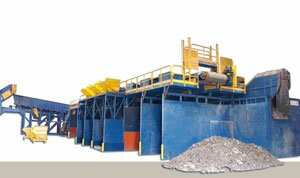ONARCHITECTURE- Coming soon! van der Linde's amazing recycling machine

On a ten-acre tract of land near Zion Crossroads, Peter van der Linde plans to finally open a $10-million, 100,000-square-foot recycling center, featuring a 270-foot state-of-the-art sorting machine, which should be operational in mid-May.
Two weeks ago, we wrote about a local builder who was shocked to discover how much perfectly good construction material was being discarded on job sites ["American dumpster: Builders deep-six too much material," January 31]. In fact, builder Darren Young discovered over $1,000 worth of usable lumber at the site of a prominent new development, and after retrieving it with the construction manager's permission, the Seattle native agreed to speak out about the issue on the condition that the Hook not reveal the name of the developer.
"I didn't come here looking for materials," said Young, "but I couldn't understand why they were throwing it away. It seemed so wasteful."
Young was also shocked to discover the dismal state of local recycling programs.
"Recycling here is a real pain in the butt," he said. "In Seattle, people are given 55-gallon containers with wheels to put their recyclables in. Trash cans are small, and recycling bins are big– it's just the opposite here."
Local builder and businessman Peter van der Linde couldn't agree more.
"People have lived for years in recycling frustration," says van der Linde, who also owns a trash container business. In fact, the dumpster Young went diving into belongs to Van der Linde Container Rentals. "It's a pain in the... neck."
As a builder for 30 years, he also agrees with Young about the volume of materials discarded on job-sites. "It's always been a big problem," he says.
Three years ago, van der Linde decided to do something about it. On a 10-acre tract of land near Zion Crossroads, he plans to finally open a $10-million, 100,000-square-foot recycling center, featuring a 270-foot state-of-the-art sorting machine, which should be operational in mid-May.
"This will be the opposite of the way it's done now," he says. "You'll just throw everything into one container, no need to separate or sort it. You don't need to lift a finger. We'll do it."
He pauses for emphasis.
"Now, everything changes, now recycling is easy," he says.
Indeed, while both the city and the county offer recycling services, the activity is nearly a full-time job. In addition to sorting and separating glass, metal, aluminum cans, newspapers, magazines, and catalogs for the city's curbside service, telephone books, file stock, and mixed paper must be taken to the McIntire Road Recycling Center. In 2003, the County stopped its curbside recycling service because it had become too expensive. In its absence, the Rivanna Solid Waste Authority published a guide directing folks to different facilities for different materials, many of which can be dropped off only at certain times. The recycling guide is three single-spaced pages long.
In contrast, van der Linde says his recycling machine can can sort 15 separate recyclable materials, including cardboard, paper, plastic, cement, carpet and pad, glass, metals, brick, block, yard waste, wood, drywall, asphalt, even styrofoam. And anything intact will be sent to Habitat for Humanity.
"This machine will recycle 90 percent of what goes into it," he says.
Indeed, the new venture will make it especially easy for all those developments tossing good lumber into his dumpsters. "Don't change anything you're doing," he says he'll tell builders. "It's business as usual. Just toss it all in there, and we'll sort it."
"Our lives just got a lot easier" says Alec Cargile, president of Lithic Construction, who says he's been waiting for someone to do this for years. "It's fantastic what he's doing, because for anyone who chooses to use this service, it will now be effortless to recycle."
"I think it's a terrific idea because he's using the same containers he's already using, and he already has his disposal business in place," says Ned Ormsby, a project manager with Lithic. "There's no need to retrain your guys; you just toss it all in there."
"I think it's a powerful thing he's doing," Cargile adds. "If people really start using his service, it could have a huge impact on the whole county."
VanderLinde says he'll rent various container sizes without charge to neighborhoods, schools, municipalities, or anyone else who wants one nearby, and then charge a standard transportation and tonnage fee. Additionally, there will be no-charge drop-off containers at the facility itself.
As for his spectacular machine, van der Linde says it was the missing link, as inferior machines and hand-sorting trash has been wildly inefficient. "In the last seven years or so, these separation machines have really been perfected," he says. "I did a lot of research on them, and I believe this one I bought is the ultimate machine."
Nearly the size of a small shopping center, the machine and the new facility will require 15 people to operate, he says. Manufactured by Sherbrooke Ltd., a Canadian company, the new machine uses optics, electromagnets, and other technologies to identify objects to be recycled. The machine can sort and separate recyclables from thousands of pounds of trash in a fraction of the time it would take to hand sort, and it deposits them neatly in separate bins. According to industry experts, the machine's ability to yield more recyclable materials faster could begin to make recycling profitable.
"There's a rapidly emerging market for recyclables," van der Linde says. "I'll just offer to supply the materials and then we'll have to see what happens."
Clearly, the idea of responding to Young's lament– and that of frustrated recyclers everywhere– appears to be worth the risk for van der Linde.
"It's just something that's long overdue," he says. "It's a real feel-good undertaking."
#